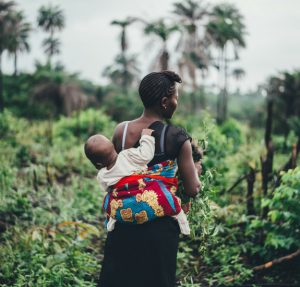March 8 is International Women’s Day, and this year, the focus is #BeBoldForChange. Daily, women all over the world practice a quiet boldness that is surreptitiously holding economies together.
I had the privilege of spending three months in Tanzania studying East African culture and history, where I saw firsthand the role of women in a developing country, ranging from their incredible knowledge and relationship with their land to their sacrifices and control of their households. I knew at the time that these families were food insecure, but had no concept of the direct correlation between women farmers and the future of global food security.
 Women are the unsung heroes in the development of rural and national economies, making up about 43% of the world’s agricultural labor force (Source: UN). In Africa, 80% of agriculture is produced by small farmers who are predominantly rural women (Source: FAO). While women are leading the charge in agricultural development, they are hindered by a number of obstacles such as equal access to resources and control of land. Women must balance being heads of households and smallholder farmers, often without the ability to make decisions or exercise control, putting them at great risk of food insecurity.
Women are the unsung heroes in the development of rural and national economies, making up about 43% of the world’s agricultural labor force (Source: UN). In Africa, 80% of agriculture is produced by small farmers who are predominantly rural women (Source: FAO). While women are leading the charge in agricultural development, they are hindered by a number of obstacles such as equal access to resources and control of land. Women must balance being heads of households and smallholder farmers, often without the ability to make decisions or exercise control, putting them at great risk of food insecurity.
There is strong evidence suggesting that if women were given the same resources as men, developing countries would produce 4% more agriculture, consequently positively impacting up to 150 million people who suffer from world hunger (Source: FAO). Teach a woman to farm and she will feed her family, empower and support her and she will contribute to establishing global food security and actively end world hunger.
 So what is being done to break through a deeply ingrained social structure in which women are not empowered to thrive? The Global Food Security Act was passed in 2016 and is committed to supporting small-scale farmers, especially women, by improving their livelihood and building capacity for long-term agricultural growth. Rise Against Hunger echo’s the U.S. government’s interests by aiming to increase agricultural production and incomes through programs promoting improved methods, business skills and market access.
So what is being done to break through a deeply ingrained social structure in which women are not empowered to thrive? The Global Food Security Act was passed in 2016 and is committed to supporting small-scale farmers, especially women, by improving their livelihood and building capacity for long-term agricultural growth. Rise Against Hunger echo’s the U.S. government’s interests by aiming to increase agricultural production and incomes through programs promoting improved methods, business skills and market access.
So what can you do to empower women farmers, impact global hunger, and #BeBoldForChange? Host a meal packaging event to be a part of a hands-on project that will have a direct impact, become an advocate to engage and empower others to take action, or donate to support empowering communities and other sustainable projects.
Today, and every day, the world must acknowledge a woman’s boldness to positively impact those around her. Given equal opportunity and resources, her quiet boldness can be developed into a roaring strength that will empower her to effectively change the world.
#BeBoldForChange on International...
 "
"